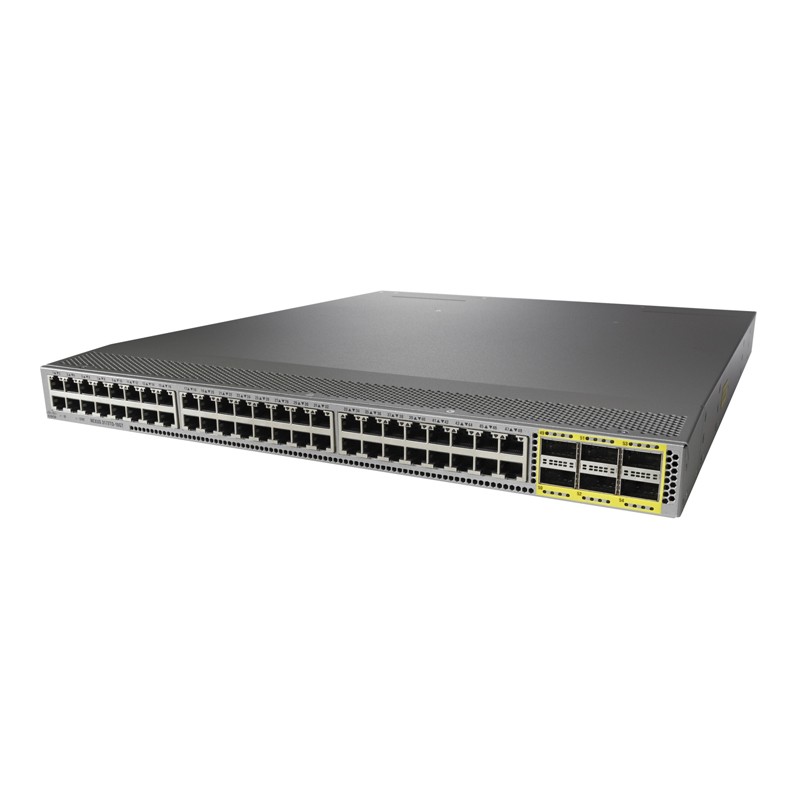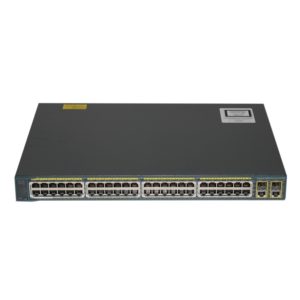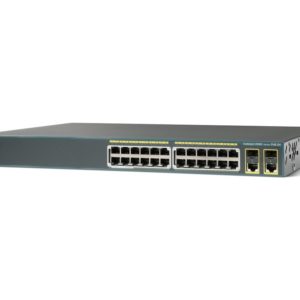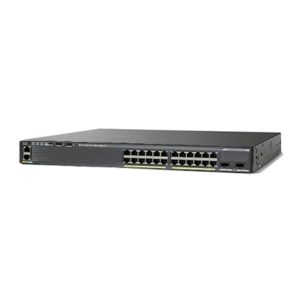Description
N3K-C3172TQ-32T Specifications |
|||
| Physical | ● 1RU fixed form factor
● 48 x 10 Gigabit Ethernet ports (32 10GBASE-T and 6 QSFP+) ◦ 32 RJ-45 ports support 100 Mbps and 1 and 10 Gigabit Ethernet ◦ 6 QSFP ports support 4 x 10 Gigabit Ethernet or 40 Gigabit Ethernet each ● Redundant fans (3+1) ● 2 redundant power supplies ● Management, console, and USB flash-memory ports |
||
| Performance | ● 1.4-Tbps switching capacity
● Forwarding rate of up to 1 bpps ● Line-rate traffic throughput (both Layer 2 and 3) on all ports ● Configurable maximum transmission units (MTUs) of up to 9216 bytes (jumbo frames) |
||
| Hardware tables and scalability | Number of MAC addresses | 288,000 | |
| Number of VLANS | 4096 | ||
| Number of spanning-tree instances | ● RSTP: 512
● MSTP: 64 |
||
| Number of ACL entries | ● 4000 ingress
● 1000 egress |
||
| Routing table | ● 16,000 prefixes and 16,000 host entries*
● 8000 multicast routes* |
||
| Number of EtherChannels | 64 (with vPC) | ||
| Number of ports per EtherChannel | 32 | ||
| System memory | 4 GB | ||
| Buffer size | 12 MB shared | ||
| Boot flash | 2 GB | ||
| Power | Number of power supplies | 2 | |
| Power supply types | ● AC (forward and reversed airflow)
◦ – N2200-PAC-400W and N2200-PAC-400W-B (PQ models) ◦ – NXA-PAC-500W and NX-PAC-500W-B (TQ models) ● DC (forward and reversed airflow) ◦ – N2200-PDC-400W and N3K-PDC-350W-B (PQ models) ◦ – NXA-PDC-500W and NX-PDC-500W-B (TQ models) |
||
| AC PSUs
● Input voltage ● Frequency ● Efficiency |
● 100 to 240 VAC ● 50 to 60 Hz ● 89 to 91% at 220V |
||
| DC PSUs
● Input voltage ● Maximum current (PSU output – System input) ● Efficiency |
● –40 to –72 VDC ● 33A (400W unit), 42A (500W unit) ● 85 to 88% |
||
| Cooling | ● Forward and reversed airflow schemes:
◦ Forward airflow: Port-side exhaust (air enters through fan-tray and power supplies and exits through ports) ◦ Reversed airflow: Port-side intake (air enters through ports and exits through fan-tray and power supplies) ● Redundant fans ● Hot swappable (must swap within 1 minute) |
||
| Sound | Measured sound power (maximum)
● Fan speed: 40% duty cycle ● Fan speed: 70% duty cycle ● Fan speed: 100% duty cycle |
● 64.9 dBA
● 69.3 dBA ● 76.7 dBA |
|
| Environment | Dimensions (height x width x depth) |
1.72 x 17.3 x 19.7 in. (4.4 x 43.9 x 50.5 cm) | |
| Weight | 22.0 lb (10 kg) | ||
| Operating temperature | ● 32 to 104°F (0 to 40°C) | ||
| Storage temperature | ● -40 to 158°F (-40 to 70°C) | ||
| Operating relative humidity | ● 10 to 85% noncondensing
● Up to 5 days at maximum (85%) humidity ● Recommend ASHRAE data center environment |
||
| Storage relative humidity | ● 5 to 95% noncondensing | ||
| Altitude | ● 0 to 10,000 ft (0 to 3000m) | ||
|
Safety and EMC |
|||
| Regulatory compliance | ● Products should comply with CE Markings per directives 2004/108/EC and 2006/95/EC. | ||
| Safety | ● UL 60950-1 Second Edition
● CAN/CSA-C22.2 No. 60950-1 Second Edition ● EN 60950-1 Second Edition ● IEC 60950-1 Second Edition ● AS/NZS 60950-1 ● GB4943 |
||
| EMC: Emissions | ● 47CFR Part 15 (CFR 47) Class A
● AS/NZS CISPR22 Class A ● CISPR22 Class A ● EN55022 Class A ● ICES003 Class A ● VCCI Class A ● EN61000-3-2 ● EN61000-3-3 ● KN22 Class A ● CNS13438 Class A |
||
| EMC: Immunity | ● EN55024
● CISPR24 ● EN300386 ● KN24 |
||
| RoHS | ● RoHS 5 compliant except for lead press-fit connectors | ||
|
Management and Standards Support |
|||
| MIB Support | Generic MIBs
● SNMPv2-SMI ● CISCO-SMI ● SNMPv2-TM ● SNMPv2-TC ● IANA-ADDRESS-FAMILY-NUMBERS-MIB ● IANAifType-MIB ● IANAiprouteprotocol-MIB ● HCNUM-TC ● CISCO-TC ● SNMPv2-MIB ● SNMP-COMMUNITY-MIB ● SNMP-FRAMEWORK-MIB ● SNMP-NOTIFICATION-MIB ● SNMP-TARGET-MIB ● SNMP-USER-BASED-SM-MIB ● SNMP-VIEW-BASED-ACM-MIB ● CISCO-SNMP-VACM-EXT-MIB ● MAU-MIB ● CISCO-SWITCH-QOS-MIB ● CISCO-CLASS-BASED-QOS-MIB Ethernet MIBs ● CISCO-VLAN-MEMBERSHIP-MIB ● LLDP-MIB ● IP-MULTICAST-MIB Configuration MIBs ● ENTITY-MIB ● IF-MIB ● CISCO-ENTITY-EXT-MIB ● CISCO-ENTITY-FRU-CONTROL-MIB ● CISCO-ENTITY-SENSOR-MIB ● CISCO-SYSTEM-MIB ● CISCO-SYSTEM-EXT-MIB ● CISCO-IP-IF-MIB ● CISCO-IF-EXTENSION-MIB ● CISCO-NTP-MIB ● CISCO-VTP-MIB ● CISCO-IMAGE-MIB ● CISCO-IMAGE-UPGRADE-MIB |
Monitoring MIBs
● NOTIFICATION-LOG-MIB ● CISCO-SYSLOG-EXT-MIB ● CISCO-PROCESS-MIB ● RMON-MIB ● CISCO-RMON-CONFIG-MIB ● CISCO-HC-ALARM-MIB Security MIBs ● CISCO-AAA-SERVER-MIB ● CISCO-AAA-SERVER-EXT-MIB ● CISCO-COMMON-ROLES-MIB ● CISCO-COMMON-MGMT-MIB ● CISCO-SECURE-SHELL-MIB Miscellaneous MIBs ● CISCO-LICENSE-MGR-MIB ● CISCO-FEATURE-CONTROL-MIB ● CISCO-CDP-MIB ● CISCO-RF-MIB Layer 3 and Routing MIBs ● UDP-MIB ● TCP-MIB ● OSPF-MIB ● BGP4-MIB ● CISCO-HSRP-MIB |
|
| Standards | ● IEEE 802.1D: Spanning Tree Protocol
● IEEE 802.1p: CoS Prioritization ● IEEE 802.1Q: VLAN Tagging ● IEEE 802.1s: Multiple VLAN Instances of Spanning Tree Protocol ● IEEE 802.1w: Rapid Reconfiguration of Spanning Tree Protocol ● IEEE 802.3z: Gigabit Ethernet ● IEEE 802.3ad: Link Aggregation Control Protocol (LACP) ● IEEE 802.3ae: 10 Gigabit Ethernet (Cisco Nexus 3064-X) ● IEEE 802.3ba: 40 Gigabit Ethernet ● IEEE 802.3an:10GBASE-T (Cisco Nexus 3064-T) ● IEEE 802.1ab: LLDP ● IEEE 1588-2008: Precision Time Protocol (Boundary Clock) |
||
| RFC | BGP
● RFC 1997: BGP Communities Attribute ● RFC 2385: Protection of BGP Sessions with the TCP MD5 Signature Option ● RFC 2439: BGP Route Flap Damping ● RFC 2519: Framework for Interdomain Route Aggregation ● RFC 2545: Use of BGPv4 Multiprotocol Extensions ● RFC 2858: Multiprotocol Extensions for BGPv4 ● RFC 3065: Autonomous System Confederations for BGP ● RFC 3392: Capabilities Advertisement with BGPv4 ● RFC 4271: BGPv4 ● RFC 4273: BGPv4 MIB: Definitions of Managed Objects for BGPv4 ● RFC 4456: BGP Route Reflection ● RFC 4486: Subcodes for BGP Cease Notification Message ● RFC 4724: Graceful Restart Mechanism for BGP ● RFC 4893: BGP Support for 4-Octet AS Number Space OSPF ● RFC 2328: OSPF Version 2 ● 8431RFC 3101: OSPF Not-So-Stubby-Area (NSSA) Option ● RFC 3137: OSPF Stub Router Advertisement ● RFC 3509: Alternative Implementations of OSPF Area Border Routers ● RFC 3623: Graceful OSPF Restart ● RFC 4750: OSPF Version 2 MIB RIP ● RFC 1724: RIPv2 MIB Extension ● RFC 2082: RIPv2 MD5 Authentication ● RFC 2453: RIP Version 2 IP Services ● RFC 768: UDP ● RFC 783: Trivial File Transfer Protocol (TFTP) ● RFC 791: IP ● RFC 792: ICMP ● RFC 793: TCP ● RFC 826: ARP ● RFC 854: Telnet ● RFC 959: FTP ● RFC 1027: Proxy ARP ● RFC 1305: Network Time Protocol (NTP) Version 3 ● RFC 1519: Classless Interdomain Routing (CIDR) ● RFC 1542: BootP Relay ● RFC 1591: Domain Name System (DNS) Client ● RFC 1812: IPv4 Routers ● RFC 2131: DHCP Helper ● RFC 2338: VRRP IP Multicast ● RFC 2236: IGMPv2 ● RFC 3376: IGMPv3 ● RFC 3446: Anycast Rendezvous Point Mechanism Using PIM and MSDP ● RFC 3569: Overview of SSM ● RFC 3618: MSDP ● RFC 4601: PIM-SM: Protocol Specification (Revised) ● RFC 4607: SSM for IP ● RFC 4610: Anycast-RP using PIM ● RFC 5132: IP Multicast MIB |
||
|
Software Features |
|||
| Layer 2 | ● Layer 2 switch ports and VLAN trunks
● IEEE 802.1Q VLAN encapsulation ● Support for up to 4096 VLANs ● Rapid Per-VLAN Spanning Tree Plus (PVRST+) (IEEE 802.1w compatible) ● MSTP (IEEE 802.1s): 64 instances ● Spanning Tree PortFast ● Spanning Tree Root Guard ● Spanning Tree Bridge Assurance ● Cisco EtherChannel technology (up to 32 ports per EtherChannel) ● LACP: IEEE 802.3ad ● Advanced port-channel hashing based on Layer 2, 3, and 4 information ● vPC ● Jumbo frames on all ports (up to 9216 bytes) ● Storm control (unicast, multicast, and broadcast) ● Private VLANs ● NvGRE entropy ● Resilient hashing |
||
| Layer 3 | ● Layer 3 interfaces: Routed ports on interfaces, switch virtual interfaces (SVIs), port channels, and subinterfaces (total: 1024)
● 64-way ECMP ● 4000 ingress and 1000 egress ACL entries ● IPv6 routing: Static, OSPFv3, and BGPv6 ● Routing protocols: Static, RIPv2, EIGRP, OSPF, and BGP ● Bidirectional Flow Detection (BFD) for BGP, OSPF, and IPv4 static routes ● HSRP and VRRP ● ACL: Routed ACL with Layer 3 and 4 options to match ingress and egress ACLs ● VRF: VRF-lite (IP VPN), VRF-aware unicast (BGP, OSPF, and RIP), and VRF-aware multicast ● Unicast Reverse-Path Forwarding (uRPF) with ACL; strict and loose modes ● Jumbo frame support (up to 9216 bytes) ● Generic Routing Encapsulation (GRE) tunneling ● Advanced BGP features including BGP add-path for eBGP and iBGP, remove-private-as enhancements and eBGP next hop unchanged ● IP-in-IP Tunnel support |
||
| Multicast | ● Multicast: PIMv2, PIM-SM, and PIM-SSM
● Bootstrap router (BSR), Auto-RP, and Static RP ● MSDP and Anycast RP ● Internet Group Management Protocol (IGMP) Versions 2 and 3 |
||
| Quality of Service (QoS) | ● Layer 2 IEEE 802.1p (class of service [CoS])
● 8 hardware queues per port ● Per-port QoS configuration ● CoS trust ● Port-based CoS assignment ● Modular QoS CLI (MQC) compliance ● ACL-based QoS classification (Layers 2, 3, and 4) ● MQC CoS marking ● Differentiated services code point (DSCP) marking ● Weighted Random Early Detection (WRED) ● CoS-based egress queuing ● Egress strict-priority queuing ● Egress port-based scheduling: Weighted Round-Robin (WRR) ● Explicit Congestion Notification (ECN) ● Configurable ECN marking per port ● Priority Flow Control (with 3 no-drop queues and 1 default queue with strict priority scheduling between queues ● Policy Based Routing (PBR) |
||
| Security | ● Ingress ACLs (standard and extended) on Ethernet
● Standard and extended Layer 3 and 4 ACLs include IPv4, Internet Control Message Protocol (ICMP), TCP, and User Datagram Protocol (UDP) ● VLAN-based ACLs (VACLs) ● Port-based ACLs (PACLs) ● Named ACLs ● ACLs on virtual terminals (vtys) ● DHCP snooping with Option 82 ● Port number in DHCP Option 82 ● DHCP relay ● Dynamic Address Resolution Protocol (ARP) inspection ● Configurable CoPP ● SPAN with ACL filtering |
||
| Cisco Nexus Data Broker | ● Topology support for TAP and SPAN aggregation
● Support for QinQ to tag input source TAP and SPAN ports ● Configuration of symmetric hashing to load-balance traffic to multiple tools ● Traffic filtering based on Layer 1 through Layer 4 header information ● Traffic replication and forwarding to multiple monitoring tools ● Robust RBAC ● Northbound representational state transfer (REST) API for all programmability support |
||
| Management | ● POAP
● Python scripting ● Cisco EEM ● Switch management using 10/100/1000-Mbps management or console ports ● CLI-based console to provide detailed out-of-band management ● In-band switch management ● Locator and beacon LEDs ● Configuration rollback ● SSHv2 ● Secure Copy (SCP) server ● Telnet ● AAA ● AAA with RBAC ● RADIUS ● TACACS+ ● Syslog ● Syslog generation on system resources (for example, FIB tables) ● Embedded packet analyzer ● SNMP v1, v2, and v3 ● Enhanced SNMP MIB support ● XML (NETCONF) support ● Remote monitoring (RMON) ● Advanced Encryption Standard (AES) for management traffic ● Unified username and passwords across CLI and SNMP ● Microsoft Challenge Handshake Authentication Protocol (MS-CHAP) ● Digital certificates for management between switch and RADIUS server ● Cisco Discovery Protocol Versions 1 and 2 ● RBAC ● SPAN on physical layer, port channel, and VLAN ● Tunable buffer allocation for SPAN ● Encapsulated Remote SPAN (ERSPAN) ● Ingress and egress packet counters per interface ● PTP (IEEE 1588) boundary clock ● Network Time Protocol (NTP) ● Cisco OHMS ● Comprehensive bootup diagnostic tests ● Cisco Call Home ● Cisco DCNM ● Advanced buffer utilization monitoring ● sFlow |
||






